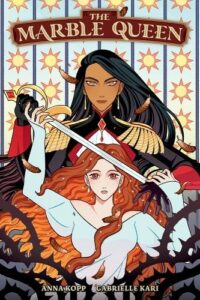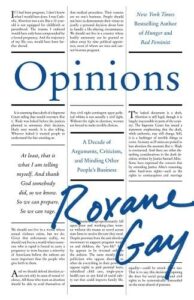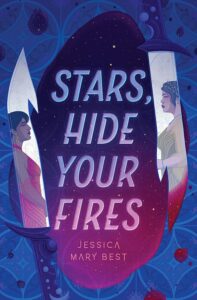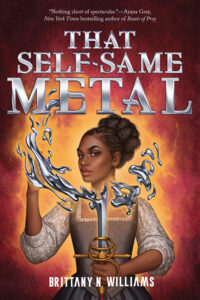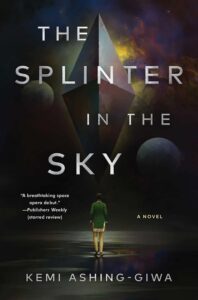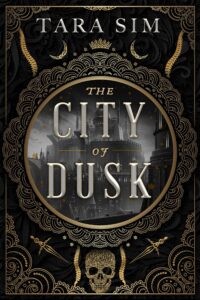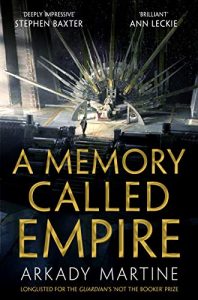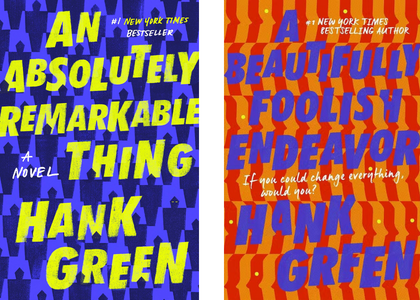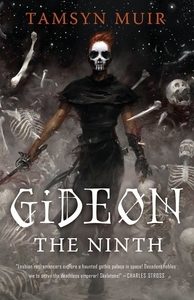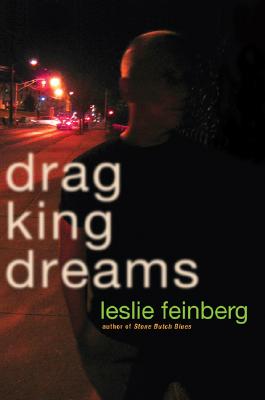Buy this from Bookshop.org to support local bookstores and the Lesbrary!
The Marble Queen is a new sapphic YA fantasy graphic novel by Anna Kopp (writer) and Gabrielle Kari (illustrator) published by Dark Horse Comics. I’ve been excited to read this book since it was announced. As someone who loves both sapphic romance and comics/graphic novels, it felt right up my alley. While I still enjoyed the book and can see how people could fall in love with it, it ended up not working for me as well as I would have liked.
It is a dire time for the Kingdom of Marion. Having just lost most of their fleet to pirates and running short of options, the kingdom needs allies quick. Seeing the suffering of her people, Princess Amelia offers herself to be married off to secure an alliance with another kingdom. Even though her parents allow her to choose between potential suitors, she tells them that she will marry the highest bidder. She assumes that is Prince Mateo of the mysterious kingdom of Iliad. However, she later discovers that she is not betrothed to the Prince, but rather his sister, the newly crowned Queen Salira. Salira needs the marriage in order to secure supplies for her own nation as well as cement her status as queen. As Amelia begins to fall in love with the queen and help her administer the kingdom, she discovers a conspiracy seeking to usurp Salira and plunge the nation into war.
Gabrielle Kari’s art is the standout aspect of this book and adds great depth to the story and characters. I loved Amelia’s character design, from her hair to all the beautiful dresses she wears, while Salira is the tall sword lesbian in a uniform that makes me swoon. Their contrasting styles also highlight the cultural differences Amelia has to face as she adjusts to her new kingdom. These differences are emphasized again with the contrast between the muted and generic look of Marion and the vibrant colors and architecture of Iliad. Kari’s use of different visual tools during Amelia’s anxiety dreams made her emotional struggles in the book feel more visceral. Gabrielle Kari uses these and other smaller visual features in the book to maximum effect to draw readers in and make them truly feel what the characters are going through.
In terms of the story, I found it to be a mixed bag. I enjoyed Amelia’s arc of coming to terms with her queerness and her role in this new foreign land. I liked Salira’s arc of learning what it means to be queen and how their struggles with anxiety were portrayed. I even found aspects of the political plot lines to be interesting. Still, I feel like both Salira’s and Amelia’s arcs got pushed too far to the side in the third act as the political narrative took over. Some aspects of their stories were even completely abandoned. There were still great character moments for both of them as the story moved towards its conclusion, but it still wasn’t enough for me. I would have liked to have seen more of the inter- and intrapersonal stories and less on the politics of the world.
Despite these shortcomings, I still enjoyed my time with The Marble Queen and would recommend it to queer YA graphic novel readers. It’s a beautifully illustrated and fun book with lots of sweet moments between its two romantic leads. If you are someone who wants your queer YA graphic novel to lean less on the melodramatic and more on swashbuckling fantasy with pretty women with swords, then you will really enjoy this book.

